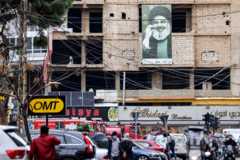The UN peacekeeping force in Lebanon says it is deeply concerned about a potential escalation of violence.A spokesperson for Unifil says a wider conflict would have devastating consequences for both Israel and Lebanon, and urges all parties to show restraint
- It comes after Hamas deputy leader Saleh al-Arouri was killed in a Beirut blast
- Israel has not confirmed whether it was behind the explosion, but has described it as a "surgical strike" on Hamas
- Lebanese Foreign Minister, Abdallah Bou Habib, has told the BBC his government has appealed to Hezbollah not to retaliate
- At least 1,200 people were killed when Hamas attacked Israel on 7 October and about 240 others were taken hostage
- The Hamas-run health ministry in Gaza says more than 22,000 people have been killed in the territory since Israel started its retaliatory campaign.
In Moucharafiyeh, in the southern suburb of Beirut where the attack took place, it’s business as usual.
The streets are crowded, the shops are open and press crews are present in very large numbers.
The main street where the killing happened is closed to the public. Lebanese Army tanks are parked alongside the road, while a large poster of Hezbollah leader, Hassan Nasrallah, adorns an unfinished high-rise nearby.
In the office that was targeted, forensic investigators in white suits survey the area and workers continue to clear the rubble while onlookers comment on the nature of the attack and how precise it was, leaving other apartments in the building almost intact.
But what people worry about the most are the military and political shockwaves of what is seen in Lebanon as a massive escalation by Israel.
Its spokesman didn’t comment directly on the killing of the Hamas official but said that Israeli forces were in “a very high state of readiness” for any response.
In the occupied West Bank, Palestinian factions have condemned the assassination, and protests have been taking place.
Hassan Nasrallah, the leader of the Lebanese armed group, Hezbollah, is due to make a speech later. He’s previously vowed a “severe reaction” to any Israeli killing on Lebanese soil.
Israeli media portray Saleh al-Arouri as having been near the top of an Israeli hit list. But some analysts point out the negative impact that his killing is likely to have on efforts to free more than 100 Israeli hostages still held by Hamas in Gaza.
Israel will “operate against Hamas leaders wherever they are”. That was Prime Minister Benjamin Netanyahu’s warning in November.
Saleh al-Arouri, Hamas's deputy leader who was killed in Beirut yesterday, was known to be on Israel’s hit lit. He was on the US’s black list too, with a bounty of $5m ($3.9m) on his head since 2018.
Israel doesn’t usually confirm or deny operations like this, but this long conflict is a history of assassinations.
Even before this war with Hamas erupted, Hezbollah’s leader Hassan Nasrallah warned that any targeted attack on Lebanese soil would trigger a “powerful response". He and his Iranian allies know their response now could change the shape of this war.
Hezbollah has tried to confine its engagement to the southern border with Israel to avoid drawing Lebanon into another costly conflagration. But this attack, in Beirut’s southern suburbs, against the Hamas official who was a key link to Hezbollah and Iran, has jolted its calculations.
Al-Arouri’s death must also be concentrating minds in Turkey and Qatar where Hamas leaders are also based, believing they’d be safer there.
Calls for restraint grow louder as the shadows stretching over this region grow longer, darker.
In the last few minutes, Gaza's Hamas-run health ministry has released its latest death toll of the war with Israel.
It says some 22,313 people are now known to have been killed since 7 October, and a further 57,296 injured.
Our colleagues at BBC Verify previously investigated how the dead are counted in Gaza - the findings of which you can find here.
Israel began its offensive against the Palestinian enclave after Hamas attacked the country in a series of cross-border attacks, killing at least 1,200 people and taking 240 others hostage.
THIS AND MANY MORE UPDATES AT: Israel-Gaza war: UN urges restraint after Hamas officials killed in Lebanon - BBC News




No comments:
Post a Comment